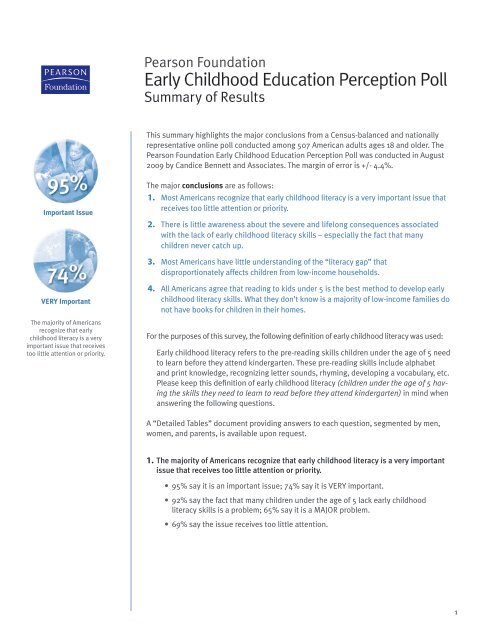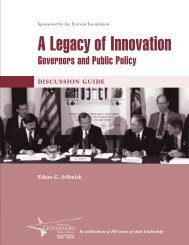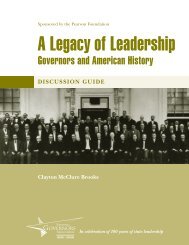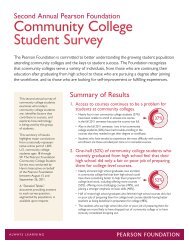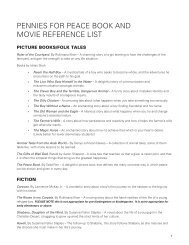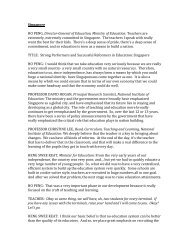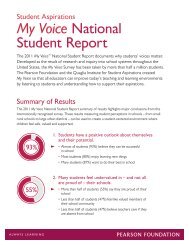the Pearson Foundation Early Childhood Education Perception Poll
the Pearson Foundation Early Childhood Education Perception Poll
the Pearson Foundation Early Childhood Education Perception Poll
Create successful ePaper yourself
Turn your PDF publications into a flip-book with our unique Google optimized e-Paper software.
<strong>Pearson</strong> <strong>Foundation</strong><br />
<strong>Early</strong> <strong>Childhood</strong> <strong>Education</strong> <strong>Perception</strong> <strong>Poll</strong><br />
Summary of Results<br />
This summary highlights <strong>the</strong> major conclusions from a Census-balanced and nationally<br />
representative online poll conducted among 507 American adults ages 18 and older. The<br />
<strong>Pearson</strong> <strong>Foundation</strong> <strong>Early</strong> <strong>Childhood</strong> <strong>Education</strong> <strong>Perception</strong> <strong>Poll</strong> was conducted in August<br />
2009 by Candice Bennett and Associates. The margin of error is +/- 4.4%.<br />
Important Issue<br />
The major conclusions are as follows:<br />
1. Most Americans recognize that early childhood literacy is a very important issue that<br />
receives too little attention or priority.<br />
2. There is little awareness about <strong>the</strong> severe and lifelong consequences associated<br />
with <strong>the</strong> lack of early childhood literacy skills – especially <strong>the</strong> fact that many<br />
children never catch up.<br />
3. Most Americans have little understanding of <strong>the</strong> “literacy gap” that<br />
disproportionately affects children from low-income households.<br />
VERY Important<br />
The majority of Americans<br />
recognize that early<br />
childhood literacy is a very<br />
important issue that receives<br />
too little attention or priority.<br />
4. All Americans agree that reading to kids under 5 is <strong>the</strong> best method to develop early<br />
childhood literacy skills. What <strong>the</strong>y don’t know is a majority of low-income families do<br />
not have books for children in <strong>the</strong>ir homes.<br />
For <strong>the</strong> purposes of this survey, <strong>the</strong> following definition of early childhood literacy was used:<br />
<strong>Early</strong> childhood literacy refers to <strong>the</strong> pre-reading skills children under <strong>the</strong> age of 5 need<br />
to learn before <strong>the</strong>y attend kindergarten. These pre-reading skills include alphabet<br />
and print knowledge, recognizing letter sounds, rhyming, developing a vocabulary, etc.<br />
Please keep this definition of early childhood literacy (children under <strong>the</strong> age of 5 having<br />
<strong>the</strong> skills <strong>the</strong>y need to learn to read before <strong>the</strong>y attend kindergarten) in mind when<br />
answering <strong>the</strong> following questions.<br />
A “Detailed Tables” document providing answers to each question, segmented by men,<br />
women, and parents, is available upon request.<br />
1. The majority of Americans recognize that early childhood literacy is a very important<br />
issue that receives too little attention or priority.<br />
• 95% say it is an important issue; 74% say it is VERY important.<br />
• 92% say <strong>the</strong> fact that many children under <strong>the</strong> age of 5 lack early childhood<br />
literacy skills is a problem; 65% say it is a MAJOR problem.<br />
• 69% say <strong>the</strong> issue receives too little attention.<br />
1
<strong>Pearson</strong> <strong>Foundation</strong><br />
<strong>Early</strong> <strong>Childhood</strong> <strong>Education</strong><br />
<strong>Perception</strong> <strong>Poll</strong><br />
Summary of Results<br />
2. There is little awareness about <strong>the</strong> severe and lifelong consequences associated<br />
with <strong>the</strong> lack of early childhood literacy skills – especially <strong>the</strong> fact that many<br />
children never catch up.<br />
Few Americans know how bad <strong>the</strong> problem is for children under 5 who are not read to<br />
before kindergarten.<br />
• Only 18% know <strong>the</strong>se children are less likely to succeed as adults.<br />
• Only 16% know <strong>the</strong>se children are more likely to have drug and alcohol problems.<br />
• Only 13% know <strong>the</strong>se children will be behind in high school.<br />
Americans incorrectly think most children that start elementary school unprepared to<br />
learn to read will catch up with <strong>the</strong>ir peers.<br />
• 73% say <strong>the</strong>se unprepared children will catch up in elementary school.<br />
• 61% wrongly believe that it takes less than a year for a child who is not read to<br />
before kindergarten to catch up with children who were.<br />
• Only 37% understand that many of <strong>the</strong>se unprepared children will never catch<br />
up and will suffer lifelong learning problems.<br />
3. Most Americans have little understanding of <strong>the</strong> “literacy gap” that<br />
disproportionately affects children from low-income households.<br />
Americans clearly underestimate <strong>the</strong> literacy gap between lower-income children and<br />
middle- and higher-income children.<br />
• 63% do not know that poverty is <strong>the</strong> best predictor of whe<strong>the</strong>r or not a child will<br />
achieve in school.<br />
• 53% are unaware that half of children from low-income families start first grade<br />
about 2 years behind <strong>the</strong>ir peers.<br />
• 84% agree that parenting, not income, explained differences in early<br />
childhood literacy.<br />
• Only 13% identified “income of parents” as an important factor impacting <strong>the</strong><br />
ability of pre-K children to develop literacy skills <strong>the</strong>y need to learn to read.<br />
4. All Americans agree that reading to kids under 5 is <strong>the</strong> best method to develop early<br />
childhood literacy skills. What <strong>the</strong>y don’t know is a majority of low-income families<br />
do not have books for children in <strong>the</strong>ir homes.<br />
Most Americans recognize <strong>the</strong> important interrelationship between books in <strong>the</strong><br />
home and early childhood literacy skills.<br />
• 80% say storybook reading with an adult is a VERY effective way to help children<br />
under 5 develop early childhood literacy skills.<br />
• 86% agree that access to books is <strong>the</strong> best way to help improve literacy skills of<br />
low-income kids.<br />
Americans do not realize that most low-income homes simply do not have<br />
age-appropriate books for children.<br />
• 75% do not know that about two-thirds of low-income households have<br />
absolutely NO books in <strong>the</strong>ir home suitable for or designed for children under<br />
<strong>the</strong> age of 5.<br />
www.pearsonfoundation.org<br />
2


